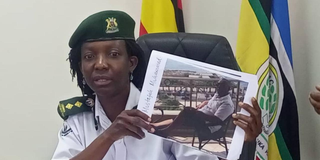Prime
Security traces Ugandan woman sold to Iraqi man for marriage

Ms Igoye displays a picture of Mustafa who had allegedly bought Shifah. Photo | URN
What you need to know:
- Ms Agnes Igoye, the deputy national coordinator of the trafficking in-persons department at the Ministry of Internal Affairs, said that the search for Shifah is finally over since she has successfully been tracked down.
Security agencies have successfully traced the Ugandan woman from Kawempe who was allegedly sold off for marriage in the Iraqi capital of Baghdadi. Officials from the Internal Affairs Ministry started tracing for the woman only identified by her pseudo name Shifah at the start July after her husband filed a case of a missing person at Kawempe police station.
Ms Agnes Igoye, the deputy national coordinator of the trafficking in-persons department at the Ministry of Internal Affairs, said that the search for Shifah is finally over since she has successfully been tracked down.
“We want to thank the team at the state house, our security personnel because in areas where we don’t have embassies we have to use various stakeholders for help,” she said.
Information gathered by the Directorate of Citizenship and Immigration Control (DCIC) and Ministry of Internal Affairs indicates that Shifah left Uganda on October 17, 2021 together with eight other girls aboard Egypt Airlines. According to Igoye, Shifah was trafficked by James Ssempijja and one Lilian who promise her a job in Saudi Arabia where she would be earning USD900 (Shs3.4 million) monthly.
However, while at the airport, Mr Ssempijja informed Shifah and the other girls that they were heading to Iraq and not Saudi Arabia as earlier planned. Nevertheless, the ladies accepted to proceed with the journey with all indications that they were being trafficked.
According to information obtained by security, Shifah’s trafficking was orchestrated by a friend of her uncle only identified as Boaz. It all started during the second lockdown in June last year when Boaz approached the victim indicating that he had a friend who had an Asian man in need of an Arabic-speaking housemaid.
Shifah, who was conversant with Arabic, saw an opportunity for her to make some money. Boaz connected her to Ssempijja who reaffirmed that there was a well-paying job for a housemaid in Saudi Arabia. Ssempijja masqueraded as a labour officer from Wakiso District and often met her outside the district offices, which gave Shifah confidence that she was dealing with a genuine person.
Trouble started when she reached Iraq and was paid USD250 instead of USD900. Igoye explains that when Shifah complained about the payment, her employer Abu Mustafa Muhammad traveled to Uganda where he met Ssempijja and Lilian.
It was at this point that Mustafa reportedly informed Ssempijja that he had fallen in love with Shifah and wanted to pay money to own her. It is not yet clear how much Mustafa paid Ssempijja and Lilian. However, when he returned to Iraq, he informed Shifah that he had paid her off for marriage.
“When she refused Mustafa’s marriage advances, he became violent and started beating her. She called her husband who filed a case at Kawempe police station drawing public attention. Mustafa had brought another man to marry this woman because she had rejected him and wanted to recover his money,” Ms Igoye said.
She added that the traffickers often tell their victims not even to share with anyone that they are going out of the country and coach them to tell lies to immigration officials.
Mr Ronnie Mukundane, the spokesperson of Uganda Association for External Recruitment Agencies, said that there are several crooks operating quark external recruitment organizations.
He identified the indicators of human traffickers as having no permanent offices and giving their clients visit visas among others.
“Once we get such companies, we alert our line ministry (Gender and Social Development). If you are being taken to work abroad on a visit visa ticket, just know you are being trafficked,” Mr Mukundane said.




